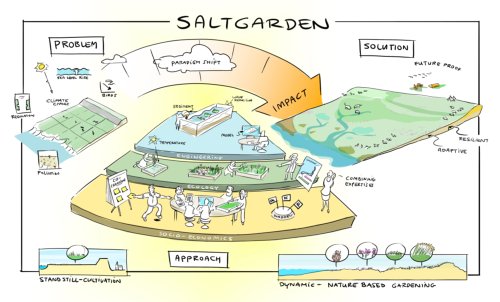Researchers from The Netherlands, Germany and Denmark are joining forces in the trilateral SALTGARDEN project. The team will investigate the dynamics and resilience of the Wadden Sea salt marshes and their contribution to ecosystem functions and services at all levels.
Erik Horstman (Faculty of Engineering Technology – Coastal Systems & Nature-based Engineering) explains ‘The Wadden Sea has to deal with many different stressors on a daily basis. It's interesting to think about ways we can help the Wadden Sea ecosystem to adapt naturally. Doing this is not just about nature, it's also about improving the livelihoods and well-being of the people in the Wadden Sea communities, now and in the future.’
The project aims for Sustainable Adaptive Landscapes through Transdisciplinary Gardening to Advance the Resilience and Dynamics of our Ecological Natural‐heritage – making the Wadden Sea a SALTGARDEN.
The Wadden Sea
The Wadden Sea is a unique intertidal wetland and a World Heritage Site. This valuable, yet vulnerable ecosystem is being threatened by the impacts of the triple ecological crisis: climate change, rapid human-induced changes in biodiversity, and pollution. The natural dynamics of the salt marshes in the Wadden Sea can contribute to the mitigation of and adaptation to the impacts of the triple ecological crisis. Salt marshes are natural carbon sinks, can trap and stabilize pollutants and sediments, and can contribute to coastal protection. However, many of the Wadden Sea salt marshes have a long history of cultivation, with a strong focus on coastal protection and agriculture.
Nature-based Gardening
The SALTGARDEN team will investigate the dynamics and resilience of such purely cultivated, static salt marshes in comparison to the functioning of biodiverse, dynamic salt marshes. To enable adaptive landscapes with biodiverse and dynamic salt marshes, the researchers aim to develop Nature-based Gardening strategies that balance human interventions and ecological self-regulation.
The interdisciplinary research team will combine engineering, ecological and socio-economic experiments and models to quantify and predict future salt marsh developments, including the impacts on the Wadden Sea communities. In collaboration with trilateral area managers, NGO’s, local citizens and stakeholders, the team will co-create the Nature-based Gardening strategies to enable adaptive landscapes and sustainable wetland management. The consolidation of these Nature-based Gardening strategies in adaptive policy pathways will future-proof Wadden Sea salt marshes and communities.
The SALTGARDEN consortium
The SALTGARDEN consortium is coordinated by Erik Horstman, researcher in the Coastal Systems & Nature-based Engineering chair at the University of Twente, together with Maike Paul and Dorothea Bunzel, Leibniz University Hannover. SALTGARDEN is 1 of 5 successful project proposals in the German-Dutch research program Understanding complex pressures on the Wadden Sea and options for action. The program is part of the Dutch Research Agenda (NWA) and is co-funded by the German Federal Ministries for the Environment (BMUV) and of Education and Research (BMBF). The consortium receives 2.8 million euros for the 4-year SALTGARDEN project.






